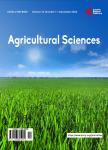Environmentally Induced Under-Development of Seeds in Garden Pea and Its Underlying Factors
Environmentally Induced Under-Development of Seeds in Garden Pea and Its Underlying Factors作者机构:Faculty of Biology-Oriented Science and Technology Kindai University Kinokawa Japan Horticultural Experiment Center Wakayama Research Center of Agriculture Forestry and Fisheries Gobo Japan
出 版 物:《Agricultural Sciences》 (农业科学(英文))
年 卷 期:2016年第7卷第7期
页 面:439-446页
主 题:ADP-Glucose Pyrophosphorylase Low Irradiation Low Temperature Starch Content Sucrose Synthase Unfilled Pods
摘 要:Under-development of pea (Pisum sativum L.) seeds in normally developed pods, resulting in “unfilled pods, has been a serious problem in the greenhouse cultivation in Wakayama Prefecture, one of the major regions of pea cultivation in Japan. This phenomenon appears to be induced by low temperature and low solar irradiation during pea growing season. This study examined the relationship between this seed under-development and sucrose-to-starch metabolism in developing seeds and pods after flowering. The starch content, ADP-glucose pyrophosphorylase (AGPase) and sucrose synthase activities of a pea cultivar, Kishuusui, were monitored through seed development in shading-treatment plot and in control plot. Results showed that the present treatment induced the depression of starch accumulation and AGPase activity in developing seeds compared with control, which might cause the occurrence of under-development of seeds and unfilled pods. Surplus carbohydrates from source organs might be stored in pod walls, as expected from higher starch level and AGPase activity in treated pod walls. The necessity of thermostable AGPase variants in pea to prevent the unfilled-pod problem was discussed.



